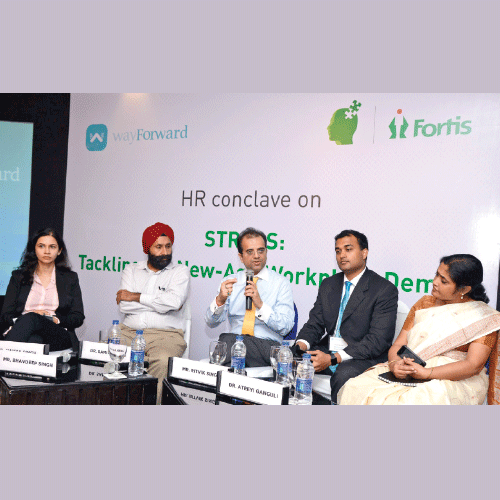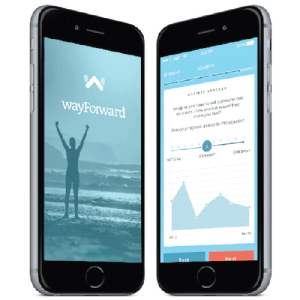
wayForward through its goal-focused approach has successfully come up with a range of modules divided into sessions of 5 to 10 minutes and including tips, interactive tools & relaxation exercises to address newer emotional health challenges being witnessed on a regular basis due to socio-economic changes in the society. wayForward aims at a long stint in the healthcare industry by offering clinically wellresearched qualitative modules to the end users, share Ritvik Singh, CEO, and Dr Navya Singh, Founder, wayForward exclusively with Elets News Network (ENN)

Ritvik Singh, CEO, wayForward
What drove you to establish an online platform addressing emotional health issues being witnessed by people on a regular basis? Please provide details.

I have a finance and engineering background, and I worked in some of the most stressful work environments on Wall Street and saw people being impacted by stress. Lot of people feel burnt out because of high stress and their performance level drops, and they find it hard to live regular life. I got more interested in the application of technology in emotional health field when I got an app made for a professor of psychology at University of Michigan that deals with mindfulness and burn out.
My co-founder, Dr Navya Singh, has worked in mental healthcare for over a decade, in three different continents and she was the driving force behind the company. She has worked with trauma survivors, such as Rwandan genocide survivors and female trauma survivors. By working with such diverse patients, such as college students to psychiatric inpatients, she realised that emotional wellness is critical to peoples overall well-being. Together with our third co-founder, Stan Miroshnikov, who is a technology expert, we started on a journey to make mental and emotional healthcare available to everyone.
As a tool how is wayForward assisting people of different age groups in aging in an emotionally healthy manner. Please walk us through the different modules and how they assist in identifying depressive symptoms and addressing them through mental strategies?

At wayForward, our philosophy is that we should solve and prevent problems before they get out of hand and cause serious illnesses, or worse outcomes for individuals, families and society. The modules are focused on solving problems, such as relationship-related issues, or work-related problems, such as work-life balance, conflict at work, or performance anxiety like public speaking anxiety or exam anxiety.
The modules are divided into small sessions of 5 to 10 minutes, which contain video-based tips and knowledge, interactive tools and relaxation exercises. In addition to our self-use programme, we can connect users with an expert trained as a counsellor or therapist as their personal coach.
What technical measures have been undertaken by wayForward to ensure data and patient privacy during the entire assessment?
The wayForward programme encrypts user data. Additionally, we do not require users to share their actual name. They can use a pseudonym. We keep personal information related to payment separate from app-based personal information.
Additionally, our text chat makes it easier to connect with our expert coaches without anyone knowing. So it maintains user privacy.
In order to increase focus on emotional health in India, could you please throw light on the business strategies and collaborations that are in the pipeline?
We have officially partnered with Fortis Healthcare across India, and are in discussions with a number of other organisations. Raising awareness about mental and emotional health is one of our main areas of focus, as we are a mission-driven company. We are reaching out to a number of not for- profit and for-profit organisations to raise awareness regarding such problems.
What are the key challenges in the field of emotional health in a country like India?
Like I mentioned in the last question, awareness is a big barrier. Stigma is another major barrier, as society accepts seeking help and care for physical health conditions like diabetes, but somehow mental health is seen as a taboo.
| wayForward “ Key Takeaways |
|
Using technology as a platform to address emotional health Aims at solving & preventing problems before they transform into serious illnesses Has modules focused on solving problems ranging from relationship-related issues to exam anxiety Maintains data & patient privacy Reaching out to not-for-profit & for-profit organisations to raise awareness Plans to launch a women-focused programme soon |
Dr Navya Singh, Founder
How will you define Emotional Health in a universal context? For you, what are the minimum requirements to consider a person emotionally healthy?

wayForward modules maintain patient privacy along with strategic mental exercises
Emotional health is the health of your mind, just as physical health is the health of your body. For a person to be emotionally healthy, they have to be able to functional optimally, maintain healthy relationships in their personal and professional lives, and be able to perform well at work or studies. For example, you might have a job and a family, yet if you wake up each morning not wanting to face the day, theres obviously something not at all right with your emotional health.
On the flip side, you could have an extremely time-consuming work life and plenty of other personal responsibilities, but if you are still able to look at the positive side of life and find pleasure in everyday living, your emotional health is likely to be better than most.
Overall, an emotionally healthy person has a good quality of life and is able to overcome problems of everyday life. Stress is a part of life, but being able to manage stress properly is essential for emotional health. We believe in preventive care, and would like to tackle issues before they get worse.
What kind of modules are available for population that remains neglected when it comes to emotional health, such as pregnant women, adolescents, elderly people, etc.
We currently have modules for relationship problems, such as problems with husband/wife, children, friends, parents, colleagues, etc. Then we have a section for work-related pressures, such as work-life balance, conflict at work or work performance. Research data suggests that anxiety starts during adolescence for most people and if left unaddressed, can lead to other problems, such as depression and substance use. We plan to launch a women-focused programme soon.
How different are the modules for workplace challenges and modules for emotional health issues witnessed in other socioeconomic spaces?
Workplace challenges differ significantly from other social spaces. And, our modules are designed to address these differences. Hence, they are goal-focused, so people can select the problem they are struggling with and what outcomes they want to address, such as, performing better at interviews, which would be more workplace related, to dealing better with relationship with ones spouse, which would be more personal. Also, we have a section for exam anxiety, which is available to students.
Be a part of Elets Collaborative Initiatives. Join Us for Upcoming Events and explore business opportunities. Like us on Facebook , connect with us on LinkedIn and follow us on Twitter , Instagram.












